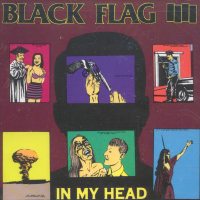Released in the post-lawsuit flurry of albums (six extended releases in two years!), In My Head was Black Flag’s swan song before collapsing. While radical lineup change would be but a few months away, with bassist Kira Roessler and drummer Bill Stevenson getting the boot, In My Head featured the tightest lineup of later-era Black Flag.
For one thing, guitarist Greg Ginn reigned in his sometimes thrilling/ sometimes masturbatory guitar theatrics. Opting more for his trademark love of sour notes than his other trademark love of messy intricacy, the album found Ginn somewhat surprisingly leaning towards metal. The material here is composed of mostly blocky, rusted edged riffs that, if played with a bit more energy and specificity, could have worked on a Venom or even Slayer album.
But of course, there is a reason Ginn slowed the pace down. In part, the band was still using My War motifs and purposefully distancing themselves from the cliché that hardcore had become. To that end, the album works. In My Head is as intense as any other route-hardcore record from ’85, but its odd footed pacing gives it a shambling complexity that suggests and intelligence above simple three chord thrashing.
Rollins, for his part, was in full on Rollins mode. The manic-comedy of songs like “Wasted” and “Jealous Again” (and even “TV Party”) had been pushed aside in favor of Rollins’ craze-eyed rambling. Track after track, he ranted about how disgusted he was with humanity. “White Hot,” like so many classic punk tracks, found Rollins inhabiting the mind of the disturbed in an effort to understand that mindset as well as appreciate the scares that were there. Perhaps this method acting would become tiresome over an entire career, but here, when confined to a single album, Rollins’ Manson-ish lashing was actually pretty harrowing stuff.
The issue with the release, which was an issue with nearly all of the post ’82 demos material, was the same issue that would push people from the band and caused the band to have such combative shows. Ginn and crew would often accuse the audience of simply not getting it, or simply wanting the same old, same old.
That may be true to a degree, but on the other hand, what if, the band instead of rushing out six platters at the rate of one every four months, spent more time on each work? These recordings are under-produced and under-rehearsed. It did go to show that, despite these takes, these recordings were able to rise above their technical limitations, thereby showing that excellent material was here. But, one wonders, with a bit more reflection by the band, a bit more editing, and a bit more focus on the boring aspect of sound quality, if these songs could have been am exciting new third phase of Black Flag- Black Flag the punk band who out-metaled the metal bands- instead of just “a bunch of songs the band tossed out” as they were rapidly speeding towards implosion.
